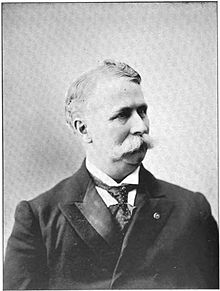Asa S. Bushnell (Governor)
| Asa Smith Bushnell | |
|---|---|
 |
|
| 40th Governor of Ohio | |
|
In office January 13, 1896 – January 8, 1900 |
|
| Lieutenant | Asa W. Jones |
| Preceded by | William McKinley |
| Succeeded by | George K. Nash |
| Personal details | |
| Born |
September 16, 1834 Rome, New York |
| Died | January 15, 1904 (aged 69) Columbus, Ohio |
| Resting place | Ferncliff Cemetery, Springfield, Ohio |
| Political party | Republican |
| Spouse(s) | Ellen Ludlow |
| Children | three |
| Religion | Methodist Episcopal Church |
| Signature | |
Asa Smith Bushnell I (September 16, 1834 – January 15, 1904) was a Republican politician from Ohio. He served as the 40th Governor of Ohio. Prior to becoming Governor, he served as the president of the Warder, Bushnell and Glessner Company, which became one of four companies that merged to form International Harvester. Other roles in business included serving as president of the Springfield Gas Company and the First National Bank of Springfield.
Bushnell was born in Rome, New York and moved to Springfield, Ohio at age 17. During the American Civil War, he raised a company of men for the 152nd Ohio Infantry, a 100 days regiment, and served as captain from May to September 1864. He was a Presidential elector in 1884 for Blaine/Logan. A business executive, Bushnell served as the Ohio State Republican Party Chair in 1885. He succeeded William McKinley as governor, serving two two-year terms from 1896 to 1900.
During the Bushnell administration, Ohio took an early leadership role in trust-busting. The Valentine Anti-Trust Act was signed into law by Bushnell. This Act prohibited price fixing, and production limitation. All of these practices helped businesses by driving up the prices for their products, thus harming the consumer. In addition to Valentine Anti-Trust Act, Bushnell's attorney general pursued the monopolistic practices of the Standard Oil Company in the courts. Eventually, U.S. Senator John Sherman of Ohio introduced the Sherman Antitrust Act in the United States Congress in 1890. This law served as the first serious attempt by the federal government to break up monopolies and trusts, though successful enforcement of anti-trust laws was still more than a decade, and new political commitment, away.
...
Wikipedia
